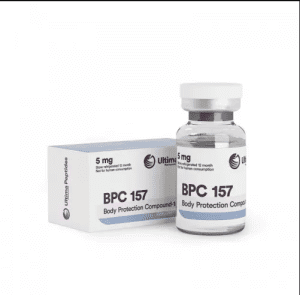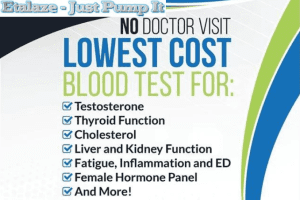Ghrelin (Mimicking Compound)
Ghrelin is a hormone produced by the stomach that signals your brain when it’s time to eat. It stimulates appetite and also plays a role in releasing insulin and growth hormones.
Ghrelin Mechanism of Action
Ghrelin exerts its effects through a well-defined mechanism of action involving its binding to specific receptors and initiating signaling pathways that influence various physiological processes. Here's a detailed look at the mechanism of action of ghrelin:
Synthesis and Release
-
- The Peptide is primarily synthesized in the stomach, specifically in the gastric fundus.
- It is also produced in smaller amounts in other tissues, such as the small intestine, pancreas, and brain.
- Ghrelin is secreted into the bloodstream, where it circulates to target tissues.
Binding to the Ghrelin Receptor
-
- Ghrelin binds to the growth hormone secretagogue receptor (GHS-R), also known as the ghrelin receptor.
- GHS-R is a G protein-coupled receptor (GPCR) located on various cells, including those in the hypothalamus, pituitary gland, and other peripheral tissues.
Activation of GHS-R
-
- Upon binding to GHS-R, ghrelin activates the receptor, which in turn initiates intracellular signaling cascades.
- This activation primarily involves the coupling of GHS-R to Gq proteins, which activate phospholipase C (PLC).
Intracellular Signaling Pathways
 Buy BPC 157 5mg by Ultima Pharmaceuticals
Buy BPC 157 5mg by Ultima Pharmaceuticals
Phospholipase C (PLC) Pathway
-
-
- Activated PLC converts phosphatidylinositol 4,5-bisphosphate (PIP2) into inositol triphosphate (IP3) and diacylglycerol (DAG).
- IP3 stimulates the release of calcium ions (Ca2+) from intracellular stores, while DAG activates protein kinase C (PKC).
- These events lead to various cellular responses, including changes in gene expression and hormone secretion.
-
Effects on the Hypothalamus
-
- The peptide acts on the arcuate nucleus of the hypothalamus, where it influences neurons involved in appetite regulation.
- It stimulates orexigenic (appetite-stimulating) neurons that express neuropeptide Y (NPY) and agouti-related peptide (AgRP).
- Simultaneously, ghrelin inhibits anorexigenic (appetite-suppressing) neurons that express pro-opiomelanocortin (POMC).
Growth Hormone Release
-
- In the pituitary gland, ghrelin stimulates the release of growth hormone (GH) by acting on somatotroph cells.
- This involves the GHS-R-mediated activation of signaling pathways that promote GH secretion.
Ghrelin Metabolic and Physiological Effects
-
- Appetite and Energy Balance: It increases hunger and food intake, promoting energy storage.
- Growth Hormone Secretion: Enhanced GH release influences growth, metabolism, and body composition.
- Gastrointestinal Function: Ghrelin affects gastrointestinal motility and gastric acid secretion.
- Cardiovascular System: The peptide has vasodilatory effects and can influence blood pressure and heart function.
Related Article: Best Creatine Pills vs. Powder – Pros and Cons of Both Forms
Ghrelin’s Role in Bodybuilding
Appetite Regulation: Ghrelin increases hunger, which can be a double-edged sword. For bodybuilders in a bulking phase, this can help increase caloric intake to support muscle growth. Conversely, during a cutting phase, elevated ghrelin levels can make it challenging to maintain a calorie deficit, potentially hindering fat loss efforts.
Growth Hormone Secretion: It stimulates the release of growth hormone (GH), which plays a crucial role in muscle growth, fat metabolism, and overall body composition. GH promotes lipolysis (fat breakdown) and muscle hypertrophy, which are beneficial for bodybuilders aiming to reduce fat while preserving muscle mass.
Metabolic Impact: Ghrelin influences energy balance and fat storage. Managing ghrelin levels can impact how efficiently the body burns fat and preserves lean muscle during periods of caloric restriction.
How Can We Regulate Ghrelin Levels?
Injecting Ghrelin would only increase hunger. However, hormones operate in feedback loops: something triggers their release, and something inhibits it. Could we identify what suppresses it and use that to reduce hunger? Indeed, this approach has been successful.
Additionally, another stomach hormone, Peptide P YY3-36, has been discovered. It dampens its secretion, leading to reduced appetite and lower food intake. This finding supports the effectiveness of eating smaller, more frequent meals for weight management. Interestingly, lean individuals produce more of this hormone than obese subjects, suggesting that obesity is a complex metabolic disorder beyond mere self-control and willpower.
Strategies for Bodybuilders
Dietary Management
Frequent Small Meals: Eating smaller, more frequent meals can help manage hunger and ghrelin levels.
High-Protein Diet: Protein has been shown to reduce ghrelin levels and increase satiety, helping to control appetite during a cutting phase.
Sleep and Stress Management
Adequate Sleep: Poor sleep increases ghrelin levels and appetite. Ensuring adequate sleep can help regulate hunger hormones.
Stress Reduction: Chronic stress can elevate ghrelin levels. Stress management techniques like meditation, yoga, or other relaxation methods can help.
Exercise
Resistance Training: While all forms of exercise can impact its levels, resistance training specifically helps in maintaining lean muscle mass and may influence hormone balance favorably.
Potential Use of Ghrelin Mimetics: In some cases, one might consider the use of growth hormone secretagogues (like GHRP-6) under medical supervision to optimize growth hormone levels. However, this should be done with caution due to potential side effects and the ethical considerations regarding performance-enhancing substances.
Overall
While ghrelin primarily stimulates hunger and can pose challenges for bodybuilders during weight loss phases, understanding and managing its effects through diet, sleep, and exercise can help optimize body composition goals. Balancing ghrelin's role in appetite regulation and growth hormone secretion is key to achieving desired outcomes in bodybuilding.















